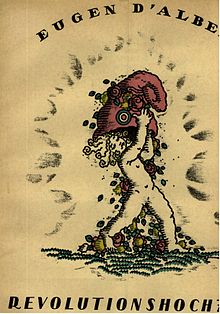Revolution wedding (opera)
| Work data | |
|---|---|
| Title: | Revolution wedding |
| Original title: | Revolution wedding |
| Original language: | German |
| Music: | Eugen d'Albert |
| Libretto : | Ferdinand Lion |
| Premiere: | October 26, 1919 |
| Place of premiere: | Leipzig |
| Place and time of the action: | Rococo palace in Trionville near Condé, April 1793 |
| people | |
Revolution Wedding is an opera in three acts by Eugen d'Albert . Ferdinand Lion wrote the libretto based on a drama by Sophus Michaëlis . The opera premiered on October 26, 1919 at the New City Theater in Leipzig .
action
first act
France in April of the revolutionary year 1793, or in the Jacobin language: in the Floreal of year 2 of the revolution. The wedding between Alaine de L'Estoile and her cousin Ernest de Tressailles is being prepared at Trionville Castle. The maid Leontine and her fiancé Prosper, a supporter of the revolution, set the table. Ernest appears through the garden door and behaves gallantly to Alaine, dispelling her last doubts about the wedding. They get married in the castle chapel. Even before supper, she got the news of the arrival of the Jacobins. Ernest flees through the patio door, and shortly afterwards the Commissioner of the Convention enters, followed by the officer Marc-Arron. Soldiers bring in the prisoner Ernest, the convention commissioner sentenced him to immediate death. Alaine asks for pity because they had just been disturbed at the wedding feast. Marc-Arron reminds of the goodness of the republic and manages to postpone execution by 12 hours.
Second act
Ernest and his wife Alaine are desperate to find a way out. Alaine has Marc-Arron called and makes the following offer to the revolutionary officer. She would grant him this night if he would let her newly wedded husband escape. Marc-Arron then exchanges clothes with Ernest, who can now escape in a Jacobin’s outfit. Alaine realizes that Marc-Arron's courage and bravery are much greater than Ernestes and gives himself to him, who renounces his right to the night of love, voluntarily.
Third act
The morning is approaching and Marc-Arron is facing up to his responsibility. He faces the death penalty for helping a convicted nobleman and émigré to escape. The Convention Commissioner appears and recognizes the betrayal. When the sentence is carried out, Alaine leaps over to Marc-Arron and hugs him completely. At the same time the shots are fired, piercing both.
literature
- Eugen d'Albert: Revolutionary wedding. Opera in three acts . Libretto. Drei Masken-Verlag, Berlin-Munich 1919, DNB 571988466 .
- Charlotte Pangels: Eugen d'Albert: wonder pianist and composer. A biography. Atlantis, Zurich / Freiburg i. Br. 1981, ISBN 3-7611-0595-9 .
